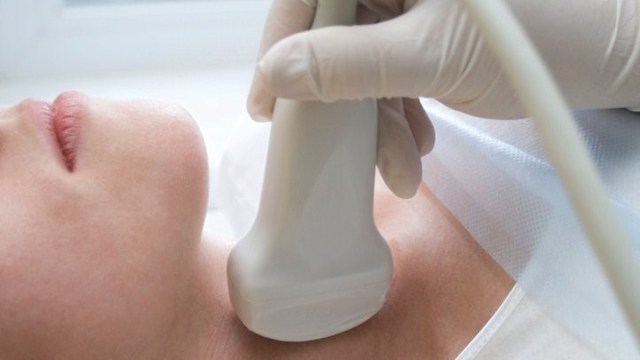When an individual has a thyroid disease, she has a condition in which the thyroid gland does not work properly. MedlinePlus noted that in the United States, millions of people have a thyroid disease, with women being diagnosed more often than men.
It may be a disease in which the thyroid gland produces too much of the thyroid hormones or too little. Some types of thyroid diseases are cancerous, while others are benign and may not cause symptoms.
Hyperthyroidism
Hyperthyroidism is a thyroid disease in which the patient’s thyroid gland produces too much of the thyroid hormones triiodothyronine and thyroxine. The overproduction of these thyroid hormones can cause symptoms such as an increased appetite, tremors, rapid heartbeat and an increased sensitivity to heat.
More than 70 percent of hyperthyroidism cases are caused by Graves’ disease, noted the American Academy of Family Physicians. Other causes of hyperthyroidism include thyroiditis and hyperfunctioning thyroid nodules.
Treatments for hyperthyroidism include radioactive iodine, surgery, anti-thyroid medicine and beta blockers.
Hypothyroidism
In the United States, about 5 percent of individuals have hypothyroidism, with women being diagnosed more often than men, according to the National Endocrine and Metabolic Diseases Information Service.
With hypothyroidism, the patient’s thyroid gland does not make enough of the thyroid hormones, resulting in symptoms such as fatigue, thinning hair, cold intolerance and a puffy face.
Several conditions can cause hypothyroidism, include radiation treatment to the neck, Hashimoto’s disease and surgical removal of the thyroid gland. Treatment for hypothyroidism is synthetic thyroxine.
Thyroiditis
Thyroiditis is a thyroid disease in which the patient has an inflammation of her thyroid gland. There are several types of thyroiditis: postpartum thyroiditis, subacute thyroiditis, silent thyroiditis, Hashimoto’s thyroiditis, acute thyroiditis, drug-induced thyroiditis and radiation-induced thyroiditis.
Thyroiditis can cause hypothyroidism, hyperthyroidism or both. For example, with postpartum thyroiditis, patients start having symptoms of hyperthyroidism, followed by symptoms of hypothyroidism.
Thyroid Cancer
There are several types of thyroid cancer: anaplastic thyroid cancer, papillary thyroid cancer, follicular thyroid cancer, medullary thyroid cancer and thyroid lymphoma.
MedlinePlus pointed out that the most common type of thyroid cancer is papillary thyroid cancer, which is also the least dangerous type. Patients with thyroid cancer may undergo surgery, radiation therapy or thyroid hormone treatment.
Goiter
When a patient has a goiter, she has an enlarged thyroid gland. Goiters are not a cancerous form of thyroid disease. Most cases of sporadic goiters have an unknown cause. Other cases result from certain medications, such as lithium.
MedlinePlus noted that colloid goiters tend to occur in areas where the soil is poor in iodine. With a toxic nodular goiter, the patient has an enlarged thyroid gland with nodules that produce excess thyroid hormone.
Graves’ Disease
An autoimmune disease, Graves’ diseases causes the thyroid gland to produce too much of the thyroid hormones. This thyroid disease is most common among women who are older than age 20, according to MedlinePlus.
Patients with Graves’ disease may experience anxiety, double vision, insomnia and menstrual irregularities.
Thyroid Nodules
A patient with thyroid nodules has growths in her thyroid, which may be solid or fluid-filled. Thyroid nodules may have benign nodules, which may not cause symptoms.
In a small group of patients, the thyroid nodule is cancerous. The treatment for a thyroid nodule will depend if the nodule is benign, malignant or causes hyperthyroidism.
References
MedlinePlus. Thyroid Diseases. Web. 26 January 2012.
http://www.nlm.nih.gov/medlineplus/thyroiddiseases.html
National Endocrine and Metabolic Diseases Information Service. Hypothyroidism. Web. 26 January 2012.
http://www.endocrine.niddk.nih.gov/pubs/Hypothyroidism
American Academy of Family Physicians. Hyperthyroidism. Web. 26 January 2012.
http://familydoctor.org/familydoctor/en/diseases-conditions/hyperthyroidism.printerview.all.html
American Academy of Family Physicians. Thyroiditis. Web. 26 January 2012.
http://familydoctor.org/familydoctor/en/diseases-conditions/thyroiditis.html
MedlinePlus Medical Encyclopedia. Thyroid Cancer. Web. 26 January 2012.
http://www.nlm.nih.gov/medlineplus/ency/article/001213.htm
MedlinePlus Medical Encyclopedia. Goiter – Simple. Web. 26 January 2012.
http://www.nlm.nih.gov/medlineplus/ency/article/001178.htm
MedlinePlus Medical Encyclopedia. Toxic Nodular Goiter. Web. 26 January 2012.
http://www.nlm.nih.gov/medlineplus/ency/article/000317.htm
MayoClinic.com. Thyroid Nodules. Web. 26 January 2012.
http://www.mayoclinic.com/print/thyroid-nodules/DS00491/DSECTION=all&METHOD=print
MedlinePlus Medical Encyclopedia. Graves Disease. Web. 26 January 2012.
http://www.nlm.nih.gov/medlineplus/ency/article/000358.htm
Reviewed January 26, 2012
by Michele Blacksberg RN
Edited by Jody Smith





Add a Comment3 Comments
Thyroid is the most important function in the body and all these diseases or having hyperthyroidism or hypothyroidism their is just one thing to it that the thyroid needs. IODINE. Many doctors today are saying that thyroid and Iodine together are very important because iodine builds thyroid hormone as the thyroid needs. They even have treated cancer patients by giving them the amount of iodine the body needs. Their are lots of information on how iodine is important and generally no one really focus on iodine which should.
Melissa
January 30, 2012 - 7:45pmThis Comment
Thyroid cancer is the cancer that is increasing the fastest in cases. It also like hyperthyroidism and hypothyroidism affects women more than men with a ratio of 3 to 1. Why the numbers are on the rise is not definite. It may be because of the advanced technology for detection, or may be the changes in the environment (pollution and chemicals). The environmental changes affect the food chain dramatically.
January 30, 2012 - 5:31pmThis Comment
Hypoerthyroid and Hypothyroid are more common especially in women. With today study many thyroid specialists are saying that if thyroid blood testing are normal means you are definitely defficient in iodine.
It is said that thyroid and iodine together are the most important role in the body and as the body have enough amount of iodine the thyroid works strong and you won't have a sluggish thyroid causing you feeling weak, fatigue or lack of energy. Sluggish thyroid definitely makes you weak.
When you are at your doctor office it is best to talk about iodine levels and be sure about this. They call it Iodine loading test the test is done through urine.
Melissa
January 26, 2012 - 6:33pmThis Comment